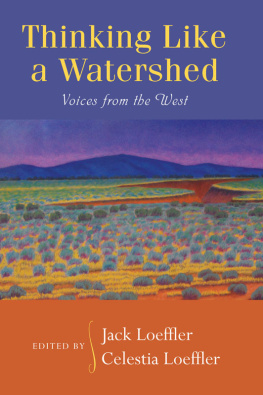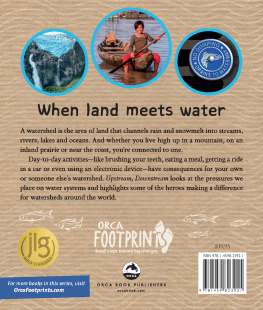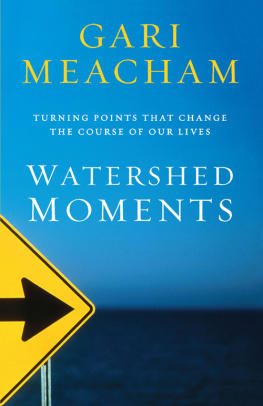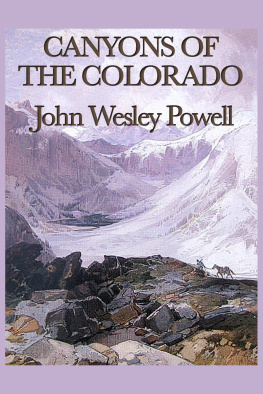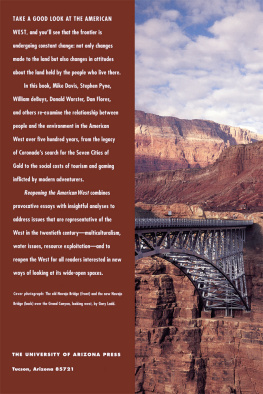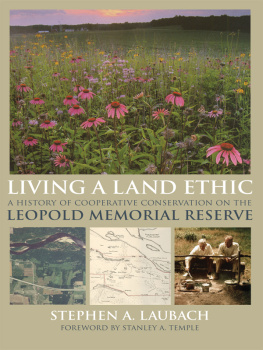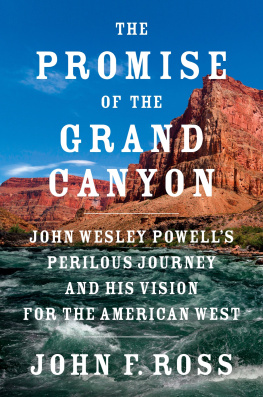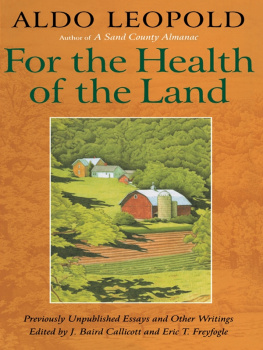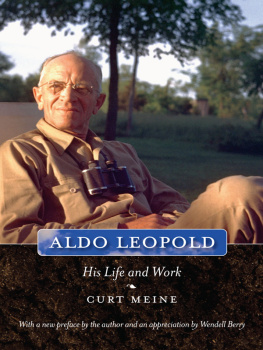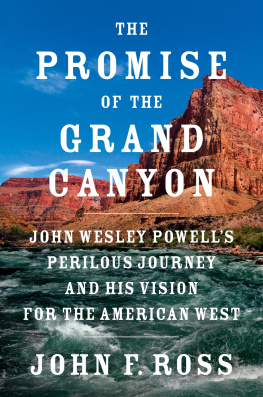Thinking Like a Watershed
Arid region of the United States showing drainage districts, entire. From Eleventh Annual Report of the United States Geological Survey, 188990 . Courtesy of the New Mexico History Library, Santa Fe
Thinking Like a Watershed
Voices from the West
EDITED BY Jack Loeffler AND Celestia Loeffler
University of New Mexico Press / Albuquerque
ISBN for this digital edition: 978-0-8263-5234-7
2012 by Jack Loeffler and Celestia Loeffler
All rights reserved. Published 2012
Printed in the United States of America
17 16 15 14 13 12 1 2 3 4 5 6
The Library of Congress has cataloged the printed edition as follows:
Thinking like a watershed : voices from the West / edited by Jack Loeffler and Celestia Loeffler.
p. cm.
Includes bibliographical references.
ISBN 978-0-8263-5233-0 (pbk. : alk. paper) ISBN 978-0-8263-5234-7 (electronic)
1. Human ecologyWest (U.S.) 2. Desert ecologyWest (U.S.) 3. Stream ecologyWest (U.S.) 4. Indigenous peoplesEcologyWest (U.S.) 5. West (U.S.)Environmental conditions. I. Loeffler, Jack, 1936 II. Loeffler, Celestia, 1981
GF504.W35T55 2012
304.20978dc23
2012024090
For our children may you remember the wisdom of the land
Acknowledgments
The Watersheds as Commons project is directly descended from an earlier Lore of the Land project that included a fifteen-part documentary radio series entitled The Lore of the Land and a book entitled Survival Along the Continental Divide , published by the University of New Mexico Press in 2008, both funded by the Ford Foundation and the New Mexico Humanities Council.
The current project involves production of a fourteen-part documentary radio series entitled Watersheds as Commons and this anthology entitled Thinking Like a Watershed , which together comprise a massive aural history with transcriptions of over one hundred recorded interviews, the creation of the Lore of the Land website, a lecture series, and a one-hour radio documentary entitled Aldo Leopold in the Southwest. Jack Loeffler has been the project director for both, working closely with coproducer Celestia Loeffler.
This project could not have been accomplished without the extraordinarily generous funding provided by the Christensen Fund of San Francisco and the New Mexico Humanities Council of Albuquerque. We have been urged ever onward by Dr. Laurie Monti and Dr. Ken Wilson of the Christensen Fund and Dr. Craig Newbill, director of the New Mexico Humanities Council. They are true friends of Lore of the Land who believe, as do we, that biodiversity and cultural diversity are inextricably interlinked and that cognitive diversity is vital for conscious and conscientious human endeavors in the coming decades.
We are also grateful to our fellow board members of the Lore of the Land, including James McGrath, Enrique Lamadrid, Lynn Udall, Suzanne Jamison, Rina Swentzell, and Sue Sturtevant, and to our late founder, Lee Udall, and her late husband and Lore of the Land fellow board member, Stewart Udall.
Weve had many years of good, solid common conversation with all of the above as well as with Bill deBuys, Gary Snyder, Bill Brown, Gary Paul Nabhan, Melissa Savage, Claude Stephenson, Richard Grow, Ed Abbey, David Menongye, and Alvin Josephy, all of whom contributed enormous consciousness to this project.
Were deeply indebted to the scores of interviewees without whose recorded words of wisdom our project would not have been realized.
Were especially grateful to our indefatigable, peerless transcriber and dear friend Yvonne Bond, without whom wed be adrift in a sea of words.
Thank you to Lesley and Bob, who shared their time, labor, love, and their precious plot of land with Celestia for the growing season.
With humility and gratitude, we thank our families, who continue to be deep wells of moral support, honesty, and love.
And most of all, we are grateful to the landscapes, the watersheds, and the traditional peoples of the North American Southwest for revealing the spirit of place and for resisting secularization of habitat, no matter how hard we try to turn our homeland into money.
Thank you.
Jack Loeffler and Celestia Loeffler for the Lore of the Land
Preface
Thinking Like a Watershed is an uncommon book, perhaps a unique book. It is an anthology of points of view expressed by people of distinct cultural backgrounds, all of whom are profoundly imbued with the spirit of place that dominates the American Southwest. The Southwest is the most arid region of North America wherein water is the rarest of the four elements. This diverse landscape has nurtured many cultures for many millennia, each culture having evolved within the context of its respective homeland. Indeed, the environment has had an enormous influence on the shaping of every culture.
It is thought that humans have inhabited this landscape for at least twelve thousand years when megafauna including wooly mammoths, dire wolves, and even horses hunted and foraged through the last Ice Age that waned into eternity ten or so millennia past. The landscape has a long memory that is revealed in striations uncovered by water coursing through canyons, or by tectonic nudges that cause mountains to rise and rifts to sunder the land, by fossils to signal the presence of the long dead, and by artifacts and rock art to indicate the skill and imagination of ancient humans whose minds were aligned with the wild. Trees that have stood for a century mark the passage of the years in incremental rings that span cross-sections of tree trunks that indicate wet years and dry years, and that are able to be cross-referenced with other tree trunks extending hundreds of years into the past. Our species has the consciousness to interpret the lands memories and, one hopes, the collective conscience to work with the land in balance and harmony.
Several major cultural points of view are expressed in the pages that follow. In a way, each point of view is a window into the memory of the land. These points of view are expressed by members of Tewa, Tohono Oodham, Hopi, Navajo, Hispano, and Anglo cultures. Most of the authors were born in the American Southwest, and all of the authors have spent a great deal of time meandering through the landscape observing what takes place, ruminating on interconnectedness, and celebrating the spirit of place. As the great cultural anthropologist Edward T. Ned Hall pointed out, cultural and cognitive diversity are among humanitys greatest assets and provide myriad means of perceiving solutions to multiple problemssuch as we face in the coming decades.
Six of the essays herein were written specifically for this anthology. The remaining five appear as excerpted interviews recorded and edited by Jack Loeffler and Celestia Loeffler. These spoken essays remain true to the manners of speech of the interviewees and reveal great depth of respective cultural perspective. The watersheds of this arid and exquisitely beautiful span of landscape are each distinct living bioregions whose myriad denizens live in a state of symbiosis with homeland. The writers and speakers represented in this anthology provide a compelling glimpse into the role of cognitive diversity as we proceed into an uncertain future.
Some of the inspiration for Thinking Like a Watershed came from the thinking of John Wesley Powell who forwarded the notion that the arid lands west of the 100th meridian should be seen as a mosaic of watershed commonwealths governed largely from within. The spirit of Aldo Leopold, who recognized the need for a land ethic guided largely by conscience, wends through parts of this book. However, the spirit of the mythic landscape of the American Southwest as revealed in the pages that follow is the true inspiration for this book.

